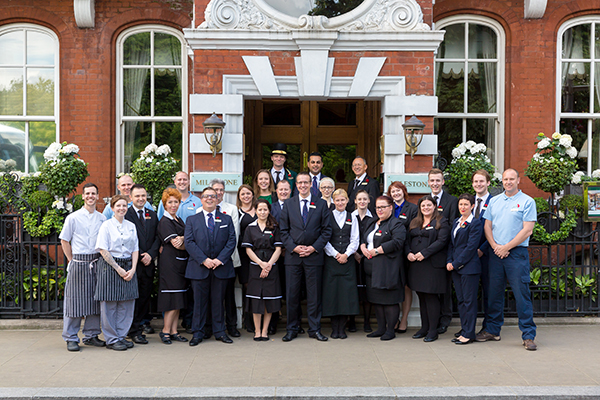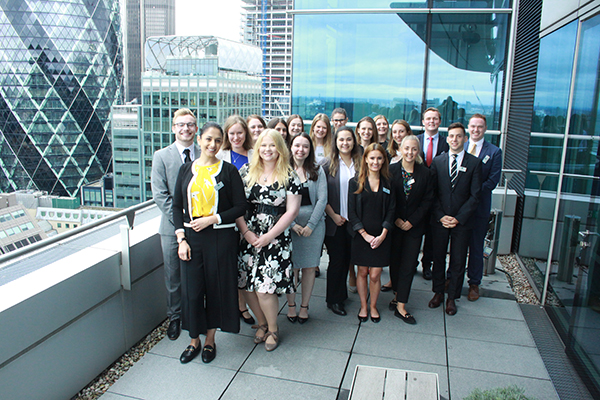An industry in crisis, part three: What the operators say
Recruitment difficulties are nothing new to the hospitality industry, but with the uncertainty Brexit has created, many operators have stepped up efforts to improve retention and entice new workers into the industry. Janie Manzoori-Stamford asks how this is happening
Just Hospitality
The foodservice operator, which featured in The Catererâs 30 Best Places to Work in Hospitality 2018 list, is focusing its recruitment drives on referrals.
âOne of the pillars of our recruitment strategy is to hire based on cultural fit,â explains managing director Dean Kennett. âUsing our existing team to refer friends and family members helps us find talent that aligns with our culture and values.â
The scheme also aims to reward and motivate staff. Once a referral has passed probation, the referee receives £100 or more depending on the role. âNot only that, they get to work with family and friends, which makes work life more fun and helps continue to build our culture,â Kennett adds.
The company, which has just more than 100 employees and operates at 12 sites as well as events, is also tackling the current labour shortage through what it terms socially inclusive recruitment.
For the last four years, Just Hospitality has worked with Highshore School in Camberwell, London, a secondary school and charity that provides education for students with special educational needs. It provides work experience for students and hired its first student from the school last year.
Red Carnation Hotels
Red Carnation Hotels has cultivated a reputation for career opportunities: it has 80 separate training courses available to the companyâs 2,500 staff, including foundation, technical and development skills.

âWe have managers in very senior roles who started out on the programme and we send them back to their college or university to talk about it,â Raggett explains. âItâs about real people saying âthis is what itâs like â" itâs not perfect, but if you come to Red Carnation you have to work really hard and, if you do, you will get rewards and promotionsâ. To have them saying that is really powerful.â
This year the company has also launched its degree apprenticeship programme, run in partnership with Pearson College London. The course gives student-apprentices on-the-job experience of working in the hospitality sector, while concurrently studying for an honours degree. It is one of the newest ways in which Red Carnation is seeking to bring talent into the business from a shrinking recruitment pool.
BaxterStorey
From its outset, BaxterStorey aimed to be an employer of choice, offering staff training and development programmes that enable them to see a clear progression path alongside opportunities for skills development.
Among its various training initiatives is its Chef Academy, which has had more than 300 graduates since launching in 2003, its Barista Academy, Leadership Academy, Advanced Management Journey, Momentum graduate programme and a Service Academy.

Since the appointment of talent manager Amy Primrose six months ago, BaxterStorey has embraced every opportunity to reach out to what it describes as a more âyouthfulâ audience, to showcase not just BaxterStorey as an employer but hospitality as an industry to embrace.
According to people director Maureen Sandbach, this is part of the companyâs commitment to âtrain from the bottom and grow our own talent for the futureâ.
It is also why, during the recent National Apprenticeship Week, the caterer has begun sharing social media posts such as âA Day in the Life of a BaxterStorey Apprenticeâ on the likes of LinkedIn and Facebook.
Cycas Hospitality
Being named Best Employer at the 2018 Catey awards unfortunately does not make a company immune to the staffing crisis that is gripping the sector. And with plans to grow to more than 10,000 rooms by 2022 â" the hotel management company currently has 2,819 suites and rooms open or in development â" maintaining a steady pipeline of talent is vital.
But with a number of recruitment initiatives already on the go, as well as an impressive 98% staff retention, Cycas Hospitality is working hard to attract and keep staff with the perfect cultural fit. For co-founder John Wagner, itâs all about personality. âLots of people say you hire for personality and you teach the skills, but weâve always done it,â he said.
Many join the company with no hospitality background, says Wagner, including a large proportion of the over-50s who make up about 10% of the companyâs workforce, having made hospitality their second career. So why did Cycas set its sights on recruiting âseniorsâ?
âA few folks came to work for us that we really liked and we realised that what they had in common was their grey hair,â explains Wagner. âWeâre working with a group that specialises in going after just that kind of employee because, frankly, theyâre very reliable. Theyâre dedicated to their job and theyâre some of the friendliest, most gregarious and engaging employees we have.â
Corbin & King
Corbin & King is working hard to retain its EU staff â" 67% of the total workforce â" as well as looking towards new labour sources for its seven-strong restaurant group.

She explained that the company writes to staff following every announcement and has pledged to assist them as they apply for settled status.
The company has also identified several opportunities to expand its employment pool closer to home.
Fennell explains: âWeâve been looking at a number of initiatives. The first was looking across our workforce and noticing that people were going off to have families and not coming back, because childcare costs are so high and working hours were tricky to balance.â
Corbin & King increased flexibility with more part-time roles and the opportunity for parents to fit their work around school runs, as well as introducing a return to work programme. The over-50s are another demographic the restaurant group is targeting, alongside a continued effort to promote the industry to school and college pupils.
The company is also ensuring it is appealing and remains visible to workers displaced by the difficulties being experienced by the restaurant industry, as well as those from other industries who may find their roles are moved overseas post-Brexit.
An industry in crisis, part one:
[[article:cjzeeaqtp5wh20887sjul3zgf]]
An industry in crisis, part two:
[[article:cjze90v6o46vm0887806o4sks]]
2019 Acorn Scholarship open for entries: nominate your high-achiever now!























